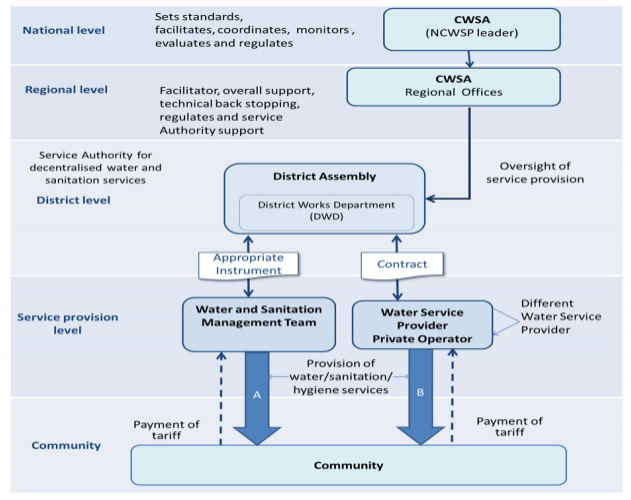Study seeks solutions for sustainable small-town water service delivery.
Published on: 28/12/2017

A study on the Innovative Financing for Capital Maintenance Expenditure (CapManEx) in Small Towns Water Systems in three Districts in Ghana, commissioned by CWSA/IRC under the Conrad N. Hilton Foundation-supported “strengthening local government capacity to deliver water services project,” has concluded that innovative mechanisms for financing capital maintenance of piped systems in Ghana may not necessarily fix the problems of poor service delivery, and that what is critical to effectively address CapManEx relates to governance and financial management regimes of the Water and Sanitation Management Teams (WSMTs).
The study, which was conducted in three districts - Akatsi South in Volta Region, East Gonja in Northern Region and Kintampo South in Brong Ahafo Region, revealed that the mechanism inherent in the National Community Water and Sanitation Strategy (NCWSS) for addressing CapManEx works for the systems set up in line with it. The water systems with inadequate mechanisms to address CapManEx were found to be characterized by limited capacity (e.g. tariff settings) and weak management (record keeping, financial management etc.). The study report also indicated that there was limited awareness and application of water sector guidelines for the management of the piped schemes by the WSMTs and the District Assemblies (DAs); tariff settings were done arbitrarily by almost all the WSMTs; tariffs used by WSMTs were not submitted to the DAs for approval; and most of the water systems were not following the NCWSS procedures of having three separate accounts with one dedicated for CapManEx.
Using focus group discussions, key informant interviews and review of existing data, the study did not find any innovative mechanisms of financing capital maintenance expenditure for piped schemes in the three districts. The main sources of finance captured are tariffs, a contribution from District Assemblies and in a few instances grants from donors. In addition, the study report indicated that none of the water systems had ever approached a bank for a loan to address CapManEx, despite the willingness of the financial institutions to provide loans to the piped schemes if WSMTs met their conditions. The report also revealed that the majority of DAs and the WSMTs were in support of the pooled funding concept on condition that the modalities for its implementation were clearly spelled out from the on-set; however, opinions differed regarding insuring components of the piped schemes.
It is pertinent to note that the rural water coverage in Ghana is on the increase but many users receive services below the CWSA prescribed basic service level (20L/c/d, within 500 m, 95% available). One of the main identified problems adversely affecting small town water service delivery is the lack of systematic maintenance as a result of inadequate funding for CapManEx and unreliable cash flow for CapManEx. The purpose of the study was to identify solutions including innovative financing mechanisms to address CapManEx for improved (affordable, reliable and sustainable) water services in small towns.
To improve small town water service delivery the study recommends that: